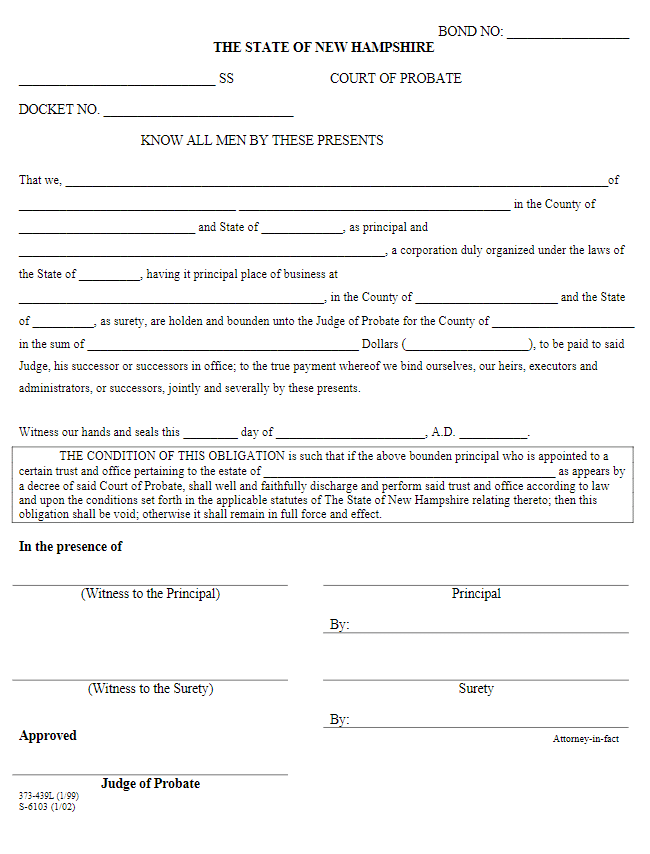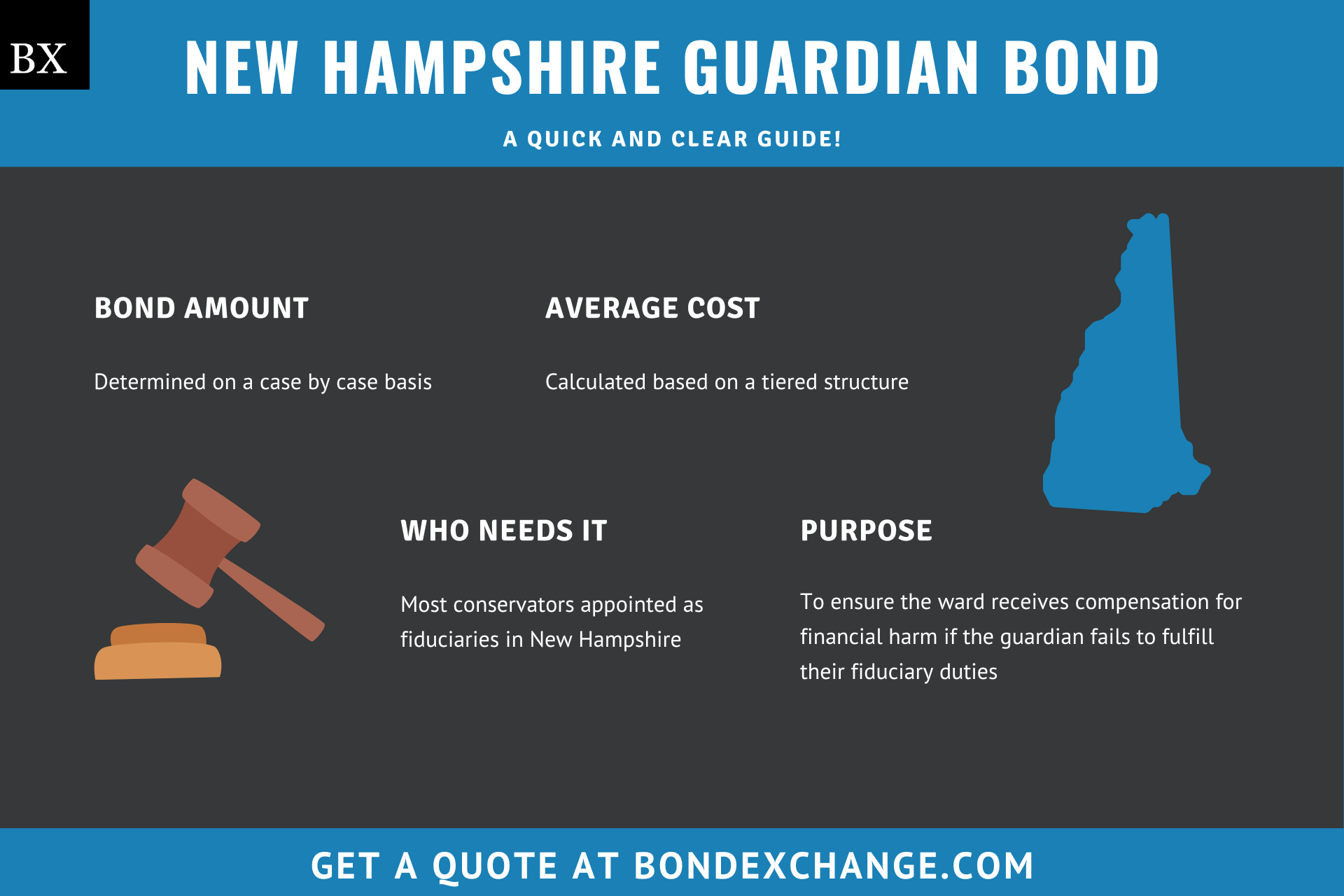New Hampshire Guardian Bond: A Comprehensive Guide
This guide provides information for insurance agents to help their customers obtain a New Hampshire Guardian bond.
At a Glance:
- Average Cost: Calculated based on a tiered structure
- Bond Amount: Determined on a case-by-case basis (more on this later)
- Who Needs It: Most guardians appointed as fiduciaries in New Hampshire
- Purpose: To ensure the ward receives compensation for financial harm if the guardian fails to fulfill their fiduciary duties
- Who Regulates Guardian Bonds in New Hampshire: The circuit court with jurisdiction over where the ward resides or has property

Background
New Hampshire Statute Title 463 and Title 464-A require all guardians to be appointed by a court before assuming their fiduciary duties. The New Hampshire legislature enacted the appointment requirement to ensure guardians act in the ward’s best interests when making decisions related to their welfare or managing their estate. To provide financial security for the enforcement of this requirement, most guardians must purchase and maintain a probate surety bond before becoming appointed as a fiduciary.
What is the Purpose of the New Hampshire Guardian Bond?
New Hampshire requires most guardians to purchase a surety bond as a prerequisite to being appointed as a fiduciary. The bond ensures that the ward will receive compensation for financial harm if the guardian fails to abide by the regulations outlined in New Hampshire Statutes 463:27 and 464-A:21. Specifically, the bond protects the ward if the guardian fails to adhere to all court orders or mismanages the estate’s assets.
For example, if a guardian uses money from the ward’s bank account to pay for the guardian’s personal expenses or mixes the estate’s funds with their own, the ward can file a claim against the guardian’s bond to recoup their losses. In short, the bond is a type of insurance that protects the ward if the guardian does not fulfill their fiduciary duties.
How Can an Insurance Agent Obtain a New Hampshire Guardian Bond?
BondExchange makes obtaining a New Hampshire Guardian bond easy. Simply log-in to your account and use our keyword search to find the “Guardian” bond in our database. Don’t have a login? Gain access now and let us help you satisfy your customers’ needs. Our friendly underwriting staff is available by phone (800) 438-1162, email or chat from 7:30 AM to 7:00 PM EST to assist you.
At BondExchange, our 40 years of experience, leading technology, and access to markets ensures that we have the knowledge and resources to provide your clients with fast and friendly service whether obtaining quotes or issuing bonds.
Not an agent? Then let us pair you with one!

Click the above image to find a BX Agent near you
How is the Bond Amount Determined?
For guardians of an adult, New Hampshire Statute 464-A:21 dictates that the bond amount must equal the aggregate capital value of the estate’s property under the guardian’s control plus the estimated income to be generated by the estate over the next year. The bond amount may be reduced by the value of any assets deposited that cannot be withdrawn without a court order or any land that the conservator can not sell without authorization from the court.
For guardians of a minor, New Hampshire Statute 463:27 authorizes the court to determine the bond amount on a case-by-case basis. In all cases, the court will set the required bond amount after the hearing (more on this later).
What are the Underwriting Requirements for the New Hampshire Guardian Bond?
Most surety companies will examine the following factors when determining eligibility for the New Hampshire Guardian bond:
- Guardian’s credit history
- Whether or not the estate has an attorney
- Whether or not the guardian is a family member
- The guardian’s occupation
- Whether or not the guardian is replacing a prior fiduciary
- If the guardian has ever committed a felony
- Whether or not there is any ongoing business in the estate
- If a creditor is requiring the bond
- If the bond amount is greater than or equal to the estate’s value
How Much Does the New Hampshire Guardian Bond Cost?
Surety companies typically determine the premium rate for Guardian bonds based on a tiered structure, so larger bond amounts will be charged a lower premium rate than smaller bonds.
The following table illustrates the pricing structure for the New Hampshire Guardian bond:
$1,500,000 Guardian Bond Cost
| Bond Amount | Premium Rate | Total Bond Cost |
|---|---|---|
| First $20,000 | 0.75% | $150 |
| Next $40,000 | 0.60% | $240 |
| Next $140,000 | 0.50% | $700 |
| Next $300,000 | 0.375% | $1,125 |
| Next $1,000,000 | 0.25% | $2,500 |
| Total cost of $4,715 |
Who is Required to Purchase the Bond?
New Hampshire requires most guardians to purchase a surety bond as a prerequisite to becoming a court-appointed fiduciary. To paraphrase New Hampshire Statute 464-A:2, a “guardian” is an individual or organization appointed as a fiduciary over a ward’s person and/or estate. Additionally, a “ward” is defined as a minor or incapacitated adult that is incapable of making sound decisions concerning their estate and/or well-being.
There are different kinds of guardianships available for both incapacitated adults and minors in New Hampshire, as outlined below:
- Guardian of the Person: A guardian authorized to take custody of and provide care for a ward, including making medical and personal decisions on their behalf. In this kind of guardianship, the court may only require a personal bond without sureties.
- Guardian of the Estate: A guardian with legal control over the finances and property of a ward. Guardians of the estate are required to obtain a bond.
- Guardian of the Person and the Estate: A guardian responsible for the care of a ward and the legal control of a ward’s estate. Guardians of a person and estate must obtain a bond.
If the gross value of the ward’s estate does not exceed $10,000 or the guardianship is of the ward’s person only, the court may allow the guardian to submit a bond without sureties. If a personal bond without sureties is required, guardians must file a fiduciary bond form.

How do New Hampshire Guardians Become Appointed as Fiduciaries?
Guardians in New Hampshire must navigate several steps to become appointed as fiduciaries. Below are the general guidelines, but appointees should refer to the appointment statutes or the New Hampshire Judicial Branch’s website for details on the process.
Guardians of a Minor
Step 1 – Hire an Attorney
Although not explicitly required, it is highly recommended that guardians hire an attorney to assist with the guardianship process.
Step 2 – File All Required Forms
Persons seeking guardianship over a ward must file a petition for appointment online via the New Hampshire Judicial Branch’s eFiling system. Petitioners can find information on the e-Filing process online here, and must ensure they submit all of the following items:
-
- Petition for Guardian of a Minor
- Criminal Record Release Authorization
- DHHS Record Release Authorization form
- $200 filing fee
- $6.92 certified mail fee for each person receiving notice
If guardianship over a minor’s estate is a result of a settlement, the petitioner must scan and upload a copy of the Petition of Approval of Settlement and Proposed Order from Superior Court or District Division to be filed electronically. The court may also require additional information such as a copy of the minor’s parent’s death certificate or a copy of the minor’s birth certificate. Petitioners can contact the court by phone for assistance.
Step 3 – Attend a Hearing
Guardians must attend a hearing conducted by the circuit court of the county where the minor resides and present evidence as to why they are in need of guardianship. The court will provide notice of the date, time, and place of the hearing through e-service. The court will examine the evidence presented by the guardian as well as that presented by the minor being evaluated (if any) and make a determination as to whether or not guardianship is necessary.
If the court finds a basis for the appointment, it will set the required bond amount that the guardian must purchase. After the guardian files the bond, the court will issue a Certificate of Appointment.
Step 4 – Purchase a Surety Bond
Unless otherwise exempt, guardians of a minor must purchase and maintain a surety bond (limits outlined above).
Guardians of an Incapacitated Adult
Step 1 – Hire an Attorney
Although not explicitly required, it is highly recommended that guardians hire an attorney to assist with the guardianship process.
Step 2 – Meet the Qualifications
Any of the following persons may serve as guardian of an incapacitated adult:
-
- A family guardian or volunteer guardian
- A professional guardian
- A public guardianship or protection program defined under Title 547-B
- A trust company or a bank having trust powers
An institution providing care and custody to the incapacitated adult is ineligible for appointment unless there is no one else to serve as guardian and the court determines there is no substantial risk of conflict of interest.
Step 3 – File All Required Forms
Persons seeking guardianship over a ward must file a petition for appointment online via the New Hampshire Judicial Branch’s e-Filing system. Petitioners can find information on the e-Filing process online here, and must ensure they submit all of the following items:
Petitioners must also pay a $240 filing fee to begin the guardianship proceedings and can contact the court by phone for assistance. In certain cases, petitioners can file for an expedited hearing is the guardianship is needed for emergency circumstances.
Step 4 – Attend a Hearing
Guardians must attend a hearing conducted by the circuit court of the county where the adult resides and present evidence as to why they are in need of guardianship. The court will provide notice of the date, time, and place of the hearing through e-service. The court will examine the evidence presented by the guardian as well as that presented by the adult being evaluated (if any) and make a determination as to whether or not guardianship is necessary.
If the court finds a basis for the appointment, it will set the required bond amount that the guardian must purchase. After the guardian files the bond, the court will issue a Certificate of Appointment.
Step 5 – Purchase a Surety Bond
Unless otherwise exempt, guardians of a minor must purchase and maintain a surety bond (limits outlined above).
How do New Hampshire Guardians File Their Bonds?
Guardians should file their completed bond forms, including the power of attorney, to the clerk of the circuit court of the county where the ward resides.
The surety bond requires signatures, including witness signatures, from the surety company that issues the bond, the applicant, and the judge presiding over the case. The surety company should include the following information on the bond form:
- Legal name and address of the entity/individual(s) buying the bond
- Legal name and county of the ward
- Surety company’s name, address, and state of incorporation
- Bond amount
- Date the bond is signed
- Docket number
What can New Hampshire Guardians do to Avoid Claims Made Against Their Bonds?
To avoid claims against their bonds, guardians in New Hampshire must ensure that they:
- Perform all of their fiduciary duties
- Obey all court orders
- Do not mishandle the estate’s assets
